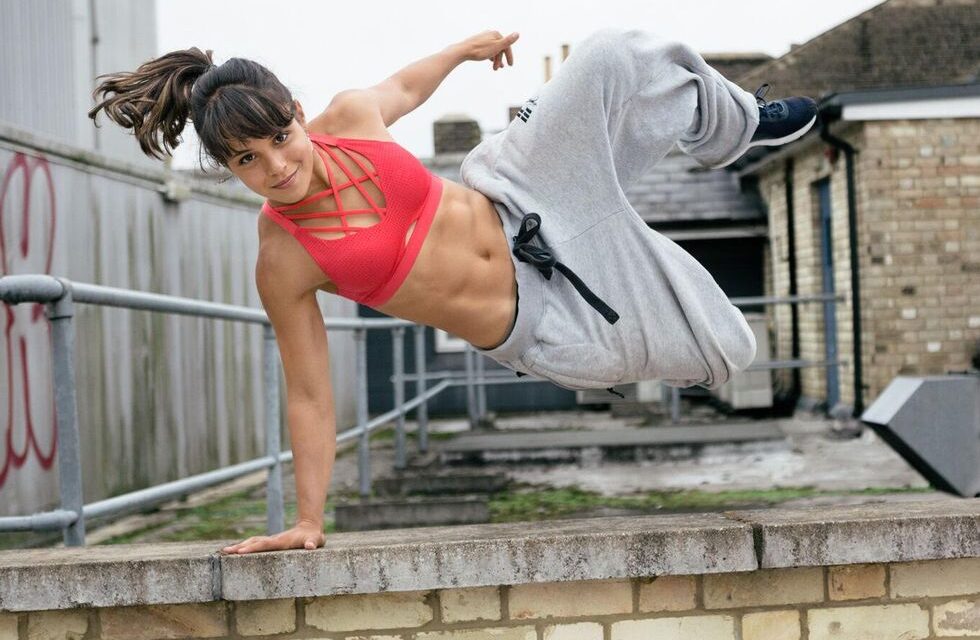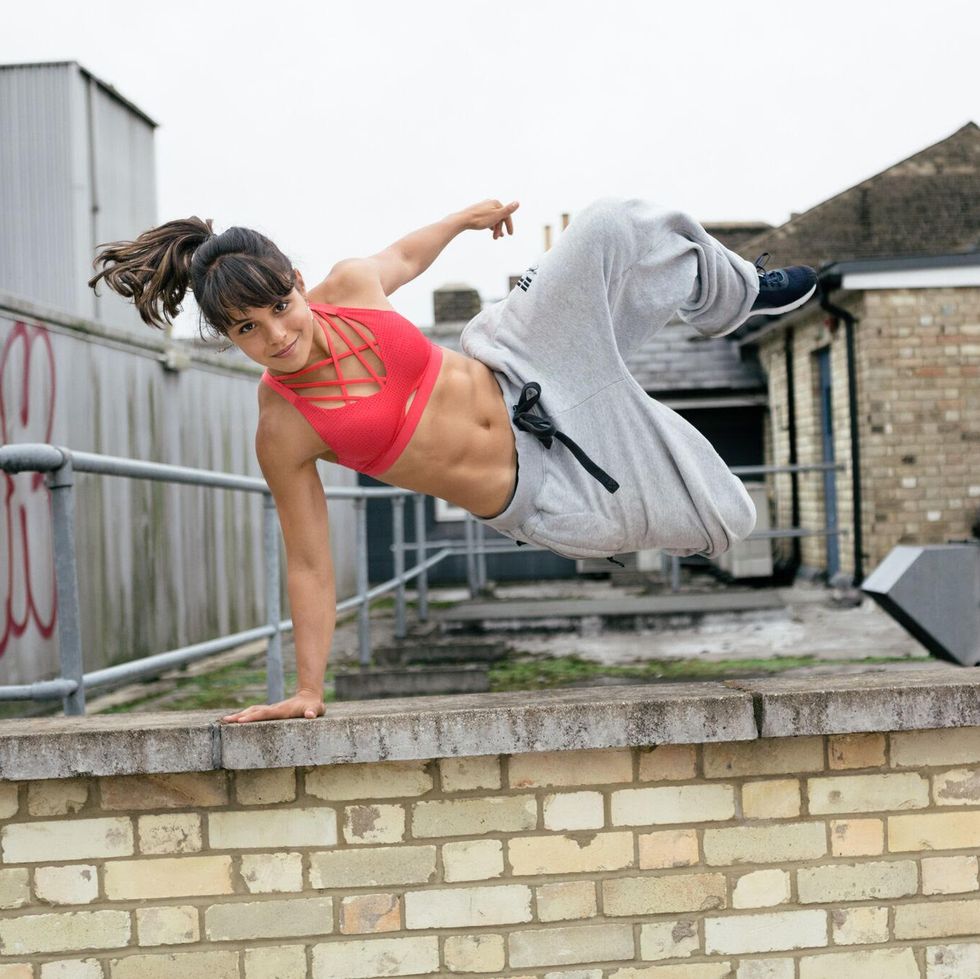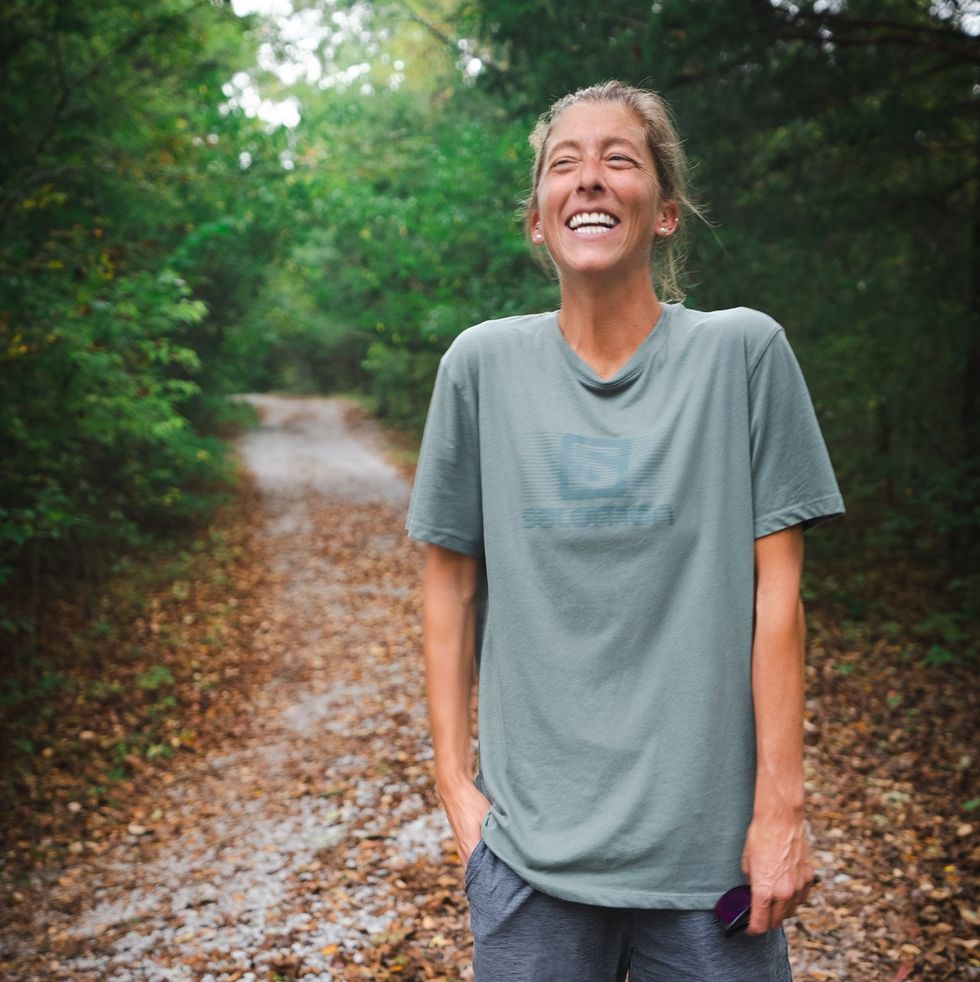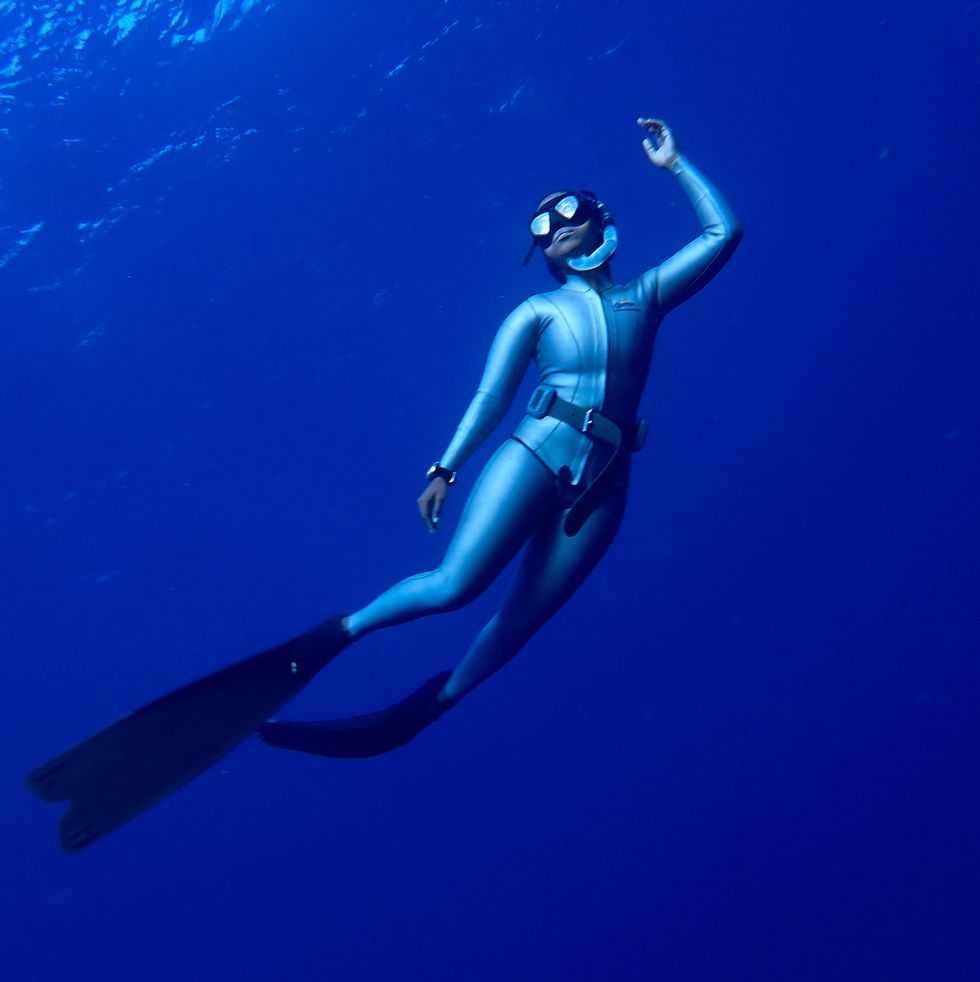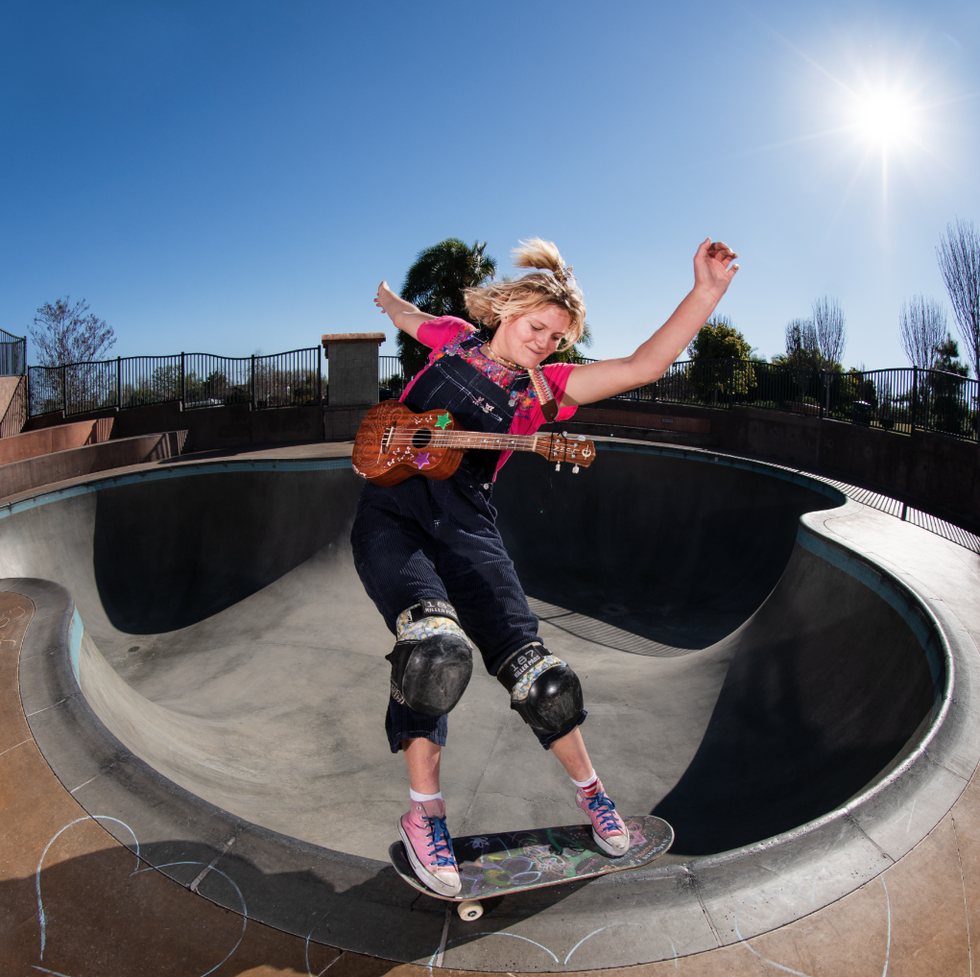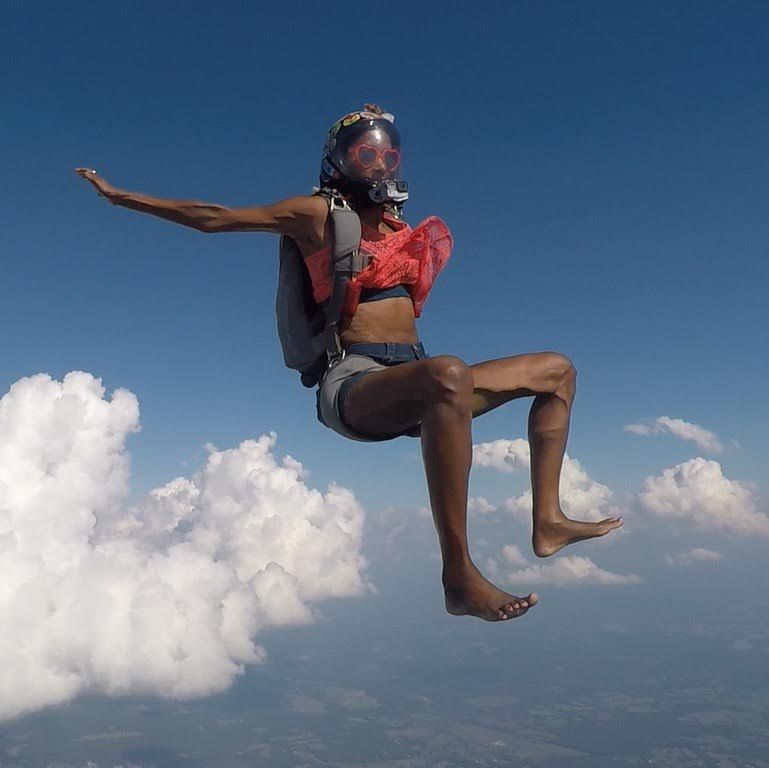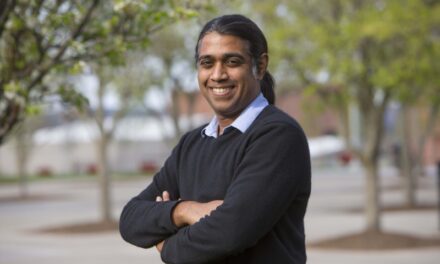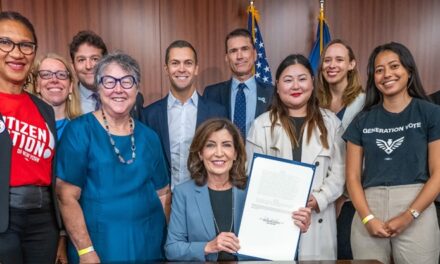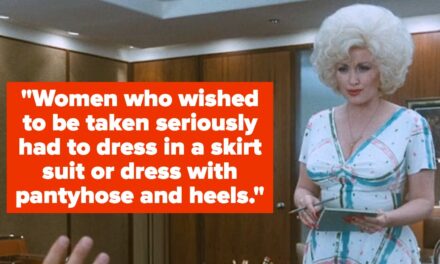In the Shondaland series Living on the Edge, we’re taking a look at trailblazers taking risks in every area from fashion and science to photography and botany to writing and extreme sports. Revealing the most intimate details of your life and challenging norms can be terrifying, but these pioneering spirits are leading the way.
There are sports, and then there are sports. Extreme athletes push themselves beyond perceived limits, flying, diving, and running farther than it seems the human body has any right to go. And thanks to the X Games, Red Bull events, and even the Olympics, they’ve been given platforms to shine, allowing athletes like surfer Bethany Hamilton and snowboarder Shaun White to become household names.
Are we about to try what they’ve spent years of their lives perfecting? No! But is it inspirational to see just how far a person can push themselves? Absolutely! Which is why this month we’ve gathered five of our favorite extreme athletes to give us insight on how they conquer fear, find community, and experience joy while living on the edge.
Lorena Abreu, parkour athlete
You might have seen Lorena Abreu in Doctor Strange in the Multiverse of Madness, or at least her figure rushing by as she performed stunts for Xochitl Gomez, aka America Chavez. It was a gig that the parkour athlete turned stunt woman had been training for her entire life. As a hyperactive kid, she excelled in dance and karate, but it wasn’t until college that she discovered parkour. It was love at first leap, a passion that led her from competitions to becoming a corporate event performer, and even holding an extremely brief tenure in Cirque du Soleil. But whether she’s on-screen or just practicing around her neighborhood, the way Abreu sees it, throwing herself at things is a way of life.
On living and breathing parkour
“I am very, very blessed to be able to say that what I do for leisure is pretty much the same thing I get paid to do. I will train two or three times a day. Because genuinely it’s what I do for fun. I don’t encourage anyone to do this — this is what works for me. I’m very hyperactive. I read an article recently that said that ADHD has been severely underdiagnosed in women. Doing parkour is literally like my Adderall. There isn’t anything else like it, because it simulates your creativity and fear response. It’s just as exhausting mentally as it is physically, and there’s absolutely nothing else that comes close to doing that for me.”
On the power of being just a little fearful
“I’m scared all the time. People ask me how I overcame my fear. And I’m like, ‘What are you talking about?’ I think one of the biggest benefits of parkour for anyone who takes up the practice is teaching fear management. You learn risk assessment skills, and you’re going to learn how to manage your fears in a way that’s safe and practical, because 90 percent of the fears of parkour are completely irrational, because the first thing we do is we learn how to fall. We generally have a plan B, a plan C, and a plan D for all the different things that can go wrong with any given move. It’s just a very primal spike in norepinephrine that raises your heart rate. So, what you do then is logically assess the actual risk and make a decision as to whether or not you’re going to do the thing anyway. And that applies to everything in life. Life is so much less daunting when I’m regularly training. You look at an obstacle, and then think, ‘How do I get there?’”
On being able to make a career out of her passion
“I have to be careful when I talk about things like this because I am coming from a place of privilege. I have a family that would have been able to support me if anything went wrong. So, I had the safety blanket to really follow my passions. Whereas a lot of people don’t have that luxury. I do think everyone should absolutely reach for their dreams and do whatever they want to do because life is short, and quite frankly, we [could] get hit by a bus tomorrow. But I also have to acknowledge the fact that most people don’t have the privilege of being able to do that as easily as I did. My family recently opened a parkour gym in South Texas. It’s the biggest parkour gym in the Americas. It’s among the biggest in the world. As someone who has traveled, I think it’s the sickest parkour gym in the world.”
Courtney Dauwalter, ultra-marathoner
Courtney Dauwalter loves exploring the Colorado wilderness, candy (fruit gummies to be exact), and challenging herself. While the first two loves have fueled her career as a runner, it’s her passion for pushing her limits that has made her a formidable ultra-marathoner, a classification of race that’s anything longer than the traditional 26.2 miles of a marathon. If this seems like an extreme distance, rest assured — it is. Dauwalter regularly competes in races that can stretch days at a time, running more than 50 to 200 miles, with a string of first-place finishes to her name. But what kicked off the dramatic journey was simply her ability to stay curious.
“I had no idea it was even a sport,” she laughs. “I grew up running — I always loved running. I was doing it every day anyway. And so, I was like, ‘I should try one of these road marathons that everyone’s doing!’ It seemed like a huge challenge, and I wanted to see if I could get to the finish line. I really didn’t think I could do 26.2 miles. I was texting goodbye to family and friends before it started because there’s no way I’m coming out the other side of this thing. And when I did finish it and my legs didn’t shatter, it triggered something for me. Like, what’s something else I could try?”
What gets her lacing up her shoes every morning
“Curiosity is a huge driver! I’m just looking for what’s possible. What can we do with our bodies, but also, how can our brains help? I just keep being surprised by how powerful our brains are. You see that displayed full on during an ultra-marathon, where it’ll physically feel like there’s no way to take another step. But if you can stay strong in your head and say some positive things to yourself, sure enough, you can take many more steps and keep moving through that. I rely on mantras a lot. I’ll just repeat over and over to myself: ‘This is fine. Everything is fine.’ Because it feels positive, but it also feels like whatever the situation is at that moment is okay, you’re struggling, but that’s fine. We can keep on moving through this and give it time to get better.”
On listening to her body
“I don’t have a coach. I don’t consider myself my own coach either, though. I don’t have any sort of training plan. So, every day I wake up, and I drink some coffee, and while I’m drinking my coffee, I basically do a system check on my body, on my brain, on my emotions — where am I at in all of these areas? And if I’m getting green lights, then I’ll push the gas pedal down and have a big day or a hard day. And if I’m getting any sort of reds or yellows, then I’ll really tune in to those to see if it’s something you push through, or if I should, you know, ease off for a little bit. But to me, it’s all just this big puzzle of figuring it out through trial and error.”
Her favorite moments in long races
“I think sunrise is always really special. Usually, these races last a day or many days, and so you’ll run through the night. During the night, you wear a headlamp, and all you can see in front of you is a little bubble of the world, and you’re living in it for that entire time. You can’t see your surroundings, and everything just feels kind of small but big at the same time. And always when sunrise hits, it feels kind of magic, where suddenly you see the landscape you’ve been running through. I get this huge boost of energy [with] all the light coming in, but also just like, ‘Oh, time has passed, and we have done things!’”
Zandi Ndhlovu, free diver and founder of the Black Mermaid Foundation
Zandi Ndhlovu will be the first to admit that free diving — deep diving without the use of an air tank — is a dramatic way to explore. Quite often, she’ll find herself more than 100 feet deep, an incredible feat that has earned her the nickname Black Mermaid. “It’s extreme because the stakes are high,” she laughs. “The whole idea is that if you don’t get this right, you swallow the ocean.”
However, being open to the idea of adventure has paid off. Having grown up in a landlocked neighborhood of Soweto in Johannesburg, she didn’t have the opportunity to spend time in the ocean until she went there on a vacation in 2016 — and it was instant love, or as she describes it, a freak-out. (“You just don’t know what you don’t know!”) Coming back home, she immediately immersed herself in the local dive community. As her comfort grew, she founded the Black Mermaid Foundation, a nonprofit dedicated to giving local township kids access to the ocean, allowing them to experience the same wonder that quickly reshaped her own life.
It’s a message of interconnectivity and love for the environment that she hopes to take even further with her new project, Shaped by Water, an art film and documentary. The film allowed Ndhlovu, as one of the three participating athletes, the opportunity to showcase her passion in a different light. While how far she travels on a single breath is up to her, free diving highlights the interconnectivity between humans and the underwater world.
“It’s a story that is looking to help everyone realize that all waters run into the ocean,” she explains. “And however we get to enjoy the water, whether it’s on ice, whether it’s on the surface, or beneath, all waters run into the ocean, and we have a responsibility to do what we can to protect these waters. The film is really just a love letter to the ocean.”
On surprise moments of magic
“I have incredible memories. Once, we were doing some depth training, and we had been hearing whale songs, but we weren’t seeing the whales. And as soon as the scuba diver who was doing safety for us got out of the water, the whales just came closer, and there was water bursting through the blowholes all around us. It was the most beautiful thing I’ve ever encountered. And around the world, Egypt is easily one of the most beautiful destinations. The visibility is clear. They’ve got beautiful marine life. They’ve got coral walls like I’ve seen nowhere else in the world. Diving in South Africa is really beautiful — Cape Town kelp forests are like nothing I’ve ever seen.”
On creating the Black Mermaid Foundation
“In 2020, I qualified as a free-diving instructor. And very soon after, we were going through lockdown. So, I’ve got this brand-new certificate, and there’s nothing I can do with it. I was part of a woman spearfishing group, and there was so much going on in the country at the time. There were high levels of gender-based violence, there was police brutality, it was that time when Black Lives Matter was even bigger. I remember going back to my spearfishing circle and saying, ‘Black women are going through the most; we should say something as a spearfishing group.’ And everyone was like, ‘No, we don’t do politics.’ And I was like, ‘Politics are my lived experience!’ Everyone was like, ‘Zandi, we see your heart.’ And I’m like, ‘The world doesn’t see my heart; the world sees my skin first.’ And that’s when I knew that I needed to create a safe space. There was a knowing in my heart that if we take children to the water, they will change the narrative. They will change the culture; they are the future. So, towards the end of 2020, we started taking kids out on snorkel trips, and we still do that to this day. And the whole idea was: What does it mean when kids are able to see beneath the surface so that they understand the greater discussion of ocean protection?”
On decolonizing diving
“Access to the ocean should be for everybody. But the ocean is a very political space. It’s a place that comes with a discussion of dispossession of lands. It’s a space of hard truths around Black bodies. And so, it’s a space of healing and connection before we can fully get to the place of enjoyment. For me, when I go to the depths of the ocean, there’s only freedom to be found. Incredible freedom. Where I come from, you never go alone. That’s something that I’ve been thinking about a lot. I could have gone way deeper. I could have chosen to push myself and win first. But what was first is to bring us all closer to the ocean. And now I’m saying, ‘Okay, I’m happy with where we are. I’m happy with what we’re doing.’ These are my goals. Let me pursue that even more, which is really exciting.”
Bryce Wettstein, Olympic skateboarder
Bryce Wettstein loves surfing, playing the ukulele, and volleyball. However, the 19-year-old’s voice grows rhapsodic while discussing skateboarding, as she pauses to carefully pick her words and reflect on each question. Fearlessly rolling through concrete bowls (a skill she started perfecting at her local YMCA) has literally changed her life, taking her to five continents and eight countries, a turn on the Dew pro tour, and even netting her a spot on the 2020 Tokyo Olympic team, where she finished sixth — the highest-placing U.S. skateboarder in the women’s park event. However, despite all the endorsements and accolades, Wettstein prefers to discuss other aspects of skating — the friends she’s made and the way it’s transformed her into a more confident person.
“Just go and trust because I’ve been trying to learn the trust part,” she says. “I’ve been trying to learn how to really trust myself.”
What she was thinking at the Olympics
“You reach the point that you’ve always wanted to get to, and you’re so used to going to something, but now you’re there. You kind of just look around you forever. You look back on all the little things you’ve done to get there, and you realize nothing was little; everything was big. I think what was going through my mind was ‘Where am I? How am I here? I’m with all these other girls that I’ve grown up with. How am I here?’ I’ve always just thought of myself as an ordinary person. But I think what I’ve learned is that us being ordinary is extraordinary.”
How skating has taught her to communicate
“I want to come off as open as I can because sometimes we can be closed off when we have to abide by these vernaculars. And we feel like sometimes I’ve just got to talk and just say something! I even met people who didn’t speak the same language as me, but it made it more of a universal language together, which was skateboarding. It’s beautiful because there’s this openness that comes across. We all have each other’s back.”
Why she’ll never stop skateboarding
“When you fall in love with falling in love with skateboarding, it’s kind of beautiful. You realize that there’s always something to fall in love with. And then, the same goes with music or art. You can fall in love with something again and again, just not one time. I realized there’s so many more ways to love it. You just accept it for whatever it is to that day.”
Danielle Williams, skydiver and founder of Melanin Base Camp
It’s rare to hear someone discuss jumping out of planes with the same casual tone one might use for running errands, particularly when it’s a woman — given that they make up only 14 percent of skydivers worldwide. But for Danielle Williams, whose extreme sports journey began in 2006 when “the Army threw me out of a plane,” regularly falling from great heights is a way of life. After a 10-year stint in the service, she continued to jump as a civilian. However, her aims have since changed.
“I spent years of my life where I was jumping every weekend,” she says. “Like four to eight times a weekend. Now, I jump about once a month in season. I try to be intentional about the time I spend jumping, and hopefully when I’m there, I’m able to jump with friends or work on a skill.”
It’s that rush of connection, both to an extreme sport and to the outdoors world as a whole, that Williams hopes to share with others. In 2018, she founded Diversify Outdoors, a nonprofit coalition aimed at promoting gender and racial diversity in nature (check out the hashtag #DiversifyOutdoors — yup, that’s her doing). She’s also the founder of Melanin Base Camp, a blog and resource center aimed at providing resources and increasing representation for members of the BIPOC community interested in any aspect of outdoor life.
“We talk about outdoor adventures and how they are not really accessible to people, and there’s this hidden knowledge inherent in these communities that you have to know to be able to access them and be able to get the right gear,” she says. “I feel like we’ve definitely grown as a blog, and we’ve grown as an online community, and hopefully people are having fun sharing with us.”
On the sport as a passion, not a profession
“I think skydiving is similar to any group activity. Whether you’re jumping or rowing or hitting, I feel like there’s something to be said for just being around other people who like doing the same thing. And it’s really playful, which you don’t really get to do as you grow older. And so, it was nice to be able to make space for that in my life to where it wasn’t like a side hustle. It wasn’t a job. It wasn’t like anything that was going to better my career or standing in life. It was just something that I was doing. And I like being with other people.”
On expanding her community with the creation of Melanin Base Camp
“When I first got started, it was my entire life. I could eat, sleep, and breathe skydiving. I really enjoyed it and traveled a lot. But it isn’t a very racially diverse sport. If I could connect with other African Americans, that would be satisfying. I got kind of curious: Where are other people who look like me? What is it for them in outdoor communities that isn’t satisfying? And so, I started reaching out to people online and met a bunch of Black climbers initially. I’d already been running social media for Black divers, but I wanted to create a platform that was more multi-sport. And that’s how Melanin Base Camp started. We don’t even use the word “sports” anymore. We changed and evolved our thinking over time. I was just kind of curious and a little bit lonely. [In the outdoors] we could be more open to beginners, and we could be more open to people who don’t consider themselves to be athletes but who still love to get outside in their own way.”
On longevity as a skydiver
“I have been doing a lot of thinking about aging in this sport, and I’m determined to be old and a fixture at a local drop zone for as long as I’m able. There are divers well into their 80s, and in fact, there’s a lot of age diversity in the sport. We have classifications and categories by age that start in your 40s. I’m 37, and when I turn 40, I will qualify to join a different group. I’m really looking forward to that. That’s what’s on my radar. I always want to have fun and not take myself too seriously.”
Laura Studarus is a Los Angeles-based travel writer who has contributed to Fast Company, BBC Travel, and Thrillist. Follow her on Twitter at @Laura_Studarus.
Get Shondaland directly in your inbox: SUBSCRIBE TODAY

